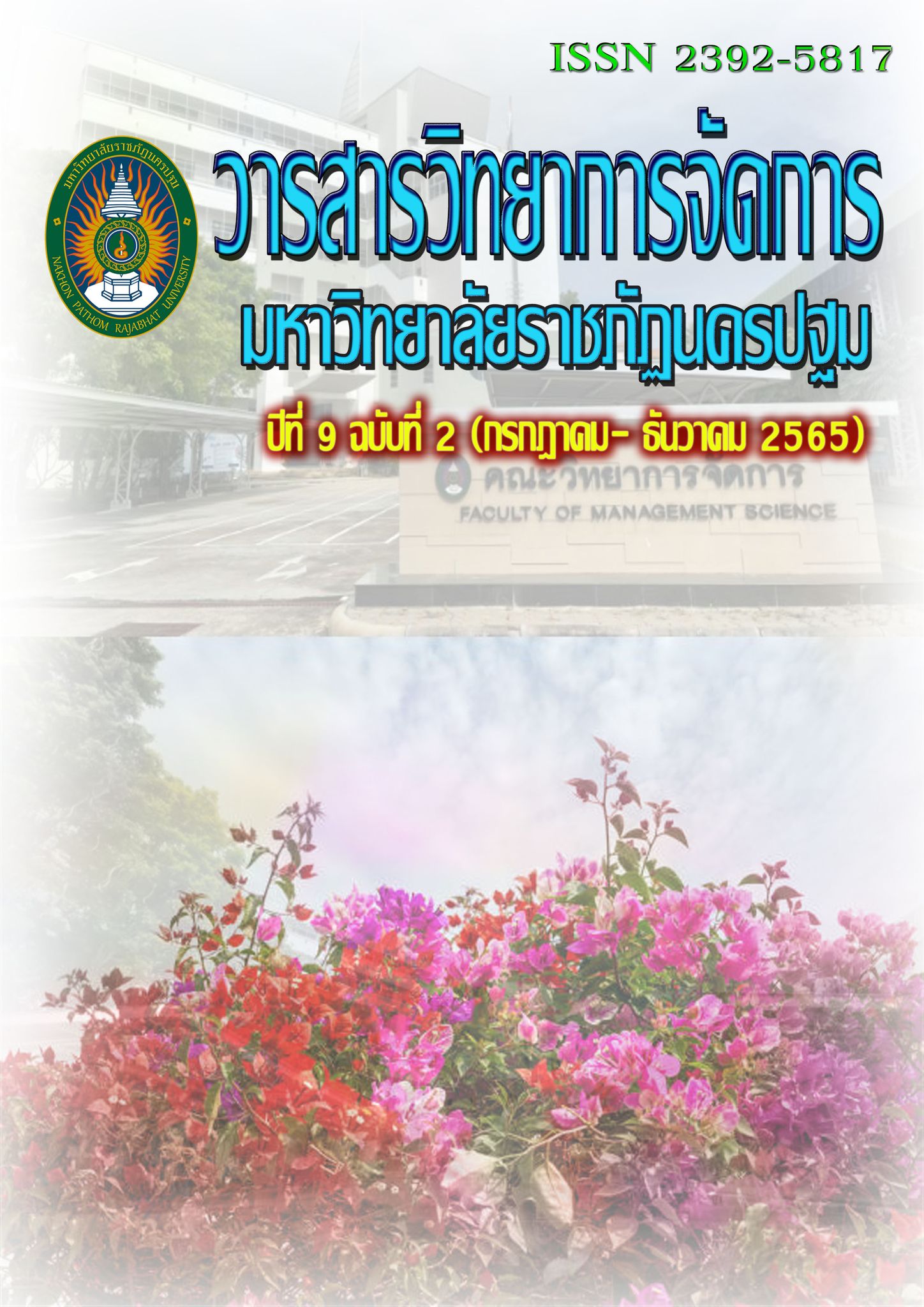A Model of Factors Contributing to the Effective Performance of Remote Working
Main Article Content
Abstract
This study aims at to 1) examine the factors that contribute to the effective performance of employees who work by remote working, and 2) develop and confirm the model of factors contributing to the effective performance of remote working with empirical data. This study was a mixed-method using the exploratory sequential design. A qualitative research was used by applying the grounded theory strategy in the begin phase. Data were collected through in-depth interviewing with 39 informants working remotely. A quantitative research was subsequently contributed by using questionnaires developed based on previous qualitative research findings with 360 people working remotely. The sample size was estimated using the method employed in the structural equation analysis, and participants were chosen using probability-based sampling. Data were analyzed using the Confirmatory Factor Analysis.
The results of the research found that the factors affecting the efficiency of employees working remotely consisted of three main factors: 1) flexibility in working, 2) environmental suitability, and 3) organizational supports. According to the quantitative investigation, the model's consistency indexes were accepted in all aspects. As a result, the model was well consistent with empirical data (X2/df =1.63, GFI = 0.97, AGFI = 0.95,
CFI = 0.99, RMSEA = 0.05). When considering the component weights of the variables in the model, it was found that all variables were statistically significant. It could be confirmed that the model was appropriate and that the structural validity could be confirmed and supported by the qualitative findings.
Article history: Received 5 May 2022
Revised 28 July 2022
Accepted 1 August 2022
SIMILARITY INDEX = 2.89 %
Article Details

This work is licensed under a Creative Commons Attribution-NonCommercial-NoDerivatives 4.0 International License.
The views and opinions of the article appearing in this journal are those of the author. It is not considered a view and responsibility of the editorial staff.
References
กรณ์ธนัญ กิมศุก. (2563). ปัจจัยที่มีอิทธิพลต่อความผูกพันต่อองค์กรของพนักงานที่มีระบบการทำงานทางไกลแบบทำที่บ้าน (Work from home). สารนิพนธ์ปริญญาการจัดการมหาบัณฑิต, วิทยาลัยการจัดการ, มหาวิทยาลัยมหิดล.
กัลยา วานิชย์บัญชา (2556). การวิเคราะห์สถิติ : สำหรับการบริหารและวิจัย. (พิมพ์ครั้งที่ 14). กรุงเทพฯ: สำนักพิมพ์แห่งจุฬาลงกรณ์มหาวิทยาลัย.
กระทรวงสาธารณสุข. (2563). ประสบการณ์ของประเทศไทยในการจัดการกับโควิด-19. [ออนไลน์]. ค้นเมื่อ 22 มกราคม 2565. จาก https://ddc.moph.go.th/viralpneumonia/eng/file/pub_doc/LDoc9.pdf.
กรมควบคุมโรค. (2563). โรคติดเชื้อไวรัสโคโรนา 2019 (COVID-19). [ออนไลน์]. ค้นเมื่อ 22 มกราคม 2565. จาก https://ddc.moph.go.th/viralpneumonia/faq_more.php.
จำเนียร จวงตระกูล. (2553). การวิจัยเชิงคุณภาพ: เครื่องมือสร้างองค์ความรู้ เพื่อการพัฒนาประเทศ. กรุงเทพฯ: ศูนย์กฎหมายธุรกิจอินเตอร์เนชั่นแนล.
ชนกนันท์ โตชูบุญ (2562). การจัดการการเปลี่ยนแปลงที่ส่งผลต่อประสิทธิภาพการทำงานที่บ้าน (Work from home) ของพนักงานบริษัทเอกชนในสภาวะวิกฤติการเกิดโรคระบาดไวรัสโควิด-19 ในเขตกรุงเทพมหานคร. [ออนไลน์]. ค้นเมื่อ 1 พฤษภาคม 2565 จาก http://www.vl-abstract.ru.ac.th/index.php/abstractData/viewIndex/150.
ดวงพร บุญเม้ง และพิพัฒน์ ไทยอารี. (2564). ปัจจัยที่มีความสัมพันธ์และมีผลกระทบต่อ Work from home ของบุคลากรในภาครัฐ. วารสารบัณฑิตศึกษา มหาวิทยาลัยธุรกิจบัณฑิตย์, 9(3), 15-27.
ยุทธ ไกยวรรณ์ (2556). การวิเคราะห์สถิติหลายตัวแปรสำหรับงานวิจัย. กรุงเทพฯ: สำนักพิมพ์แห่งจุฬาลงกรณ์มหาวิทยาลัย.
Aropah, V.D., Sarama, M., & Sumertajaya, I. M.(2020). Factors Affecting Employee Performance during Work from Home. International Research Journal of Business Studies, 13(2), 201-204.
Al-Habaibeh, A., Watkins, M., Waried, K., Javareshk, M.B. (2021). Challenges and opportunities of remotely working from home during Covid-19 pandemic. Global Transitions, 3, 99-108,
AVL. (2021). Remote Work รูปแบบการทำงานแบบใหม่ที่องค์กรต้องปรับตัว. [ออนไลน์]. ค้นเมื่อ 20 มีนาคม 2565, จาก https://avl.co.th/blogs/remote-work-a-new-way-of-working/.
Bollen, K.A. (1989). Structural Equation with Latent Variable. New York: John Wiley and Sons.
Cambridge Dictionary. (2022). Meaning of remote working in English: remote working. Retrieved May,1, 2022, from https://dictionary.cambridge.org/dictionary/english/remote-working.
Creswell, J. W. (1998). Qualitative inquiry and research design: Choosing among five traditions. California: SAGE.
Creswell, J. W. (2012). Educational research: planning, conducting, and evaluating quantitative and qualitative research (4th ed.). Boston: Pearson Education.
Creswell, J. W. (2013). Qualitative Inquiry and Research Design: Choosing among Five Approaches (3rd ed.). United States of America: SAGE.
Creswell, J. W. (2014). Research Design: Qualitative, Quantitative, and Mixed Methods Approaches (4th ed.). London: SAGE.
Cronbach, L. J. (1970). Essentials of Psychological Testing. New York: Harper & Row.
Crosbie, T., & Moore, J. (2004). Work-life Balance and Working from Home. Social Policy & Society 3(3), 223-233.
Fried, J., & Hanssan, D. H. (2013). Remote: Office not required. United States: Crown Business.
Glaser, B. G., & Holton, J. (2004). Remodeling grounded theory. In Forum qualitative sozialforschung/forum: qualitative social research .5 (2). https://doi.org/10.17169/fqs-5.2.607
Hair, J.F., Black, W.C., Babin, B.J., and Anderson, R.E. (2010). Multivariate Data Analysis. (7th ed.). New Jursey: Pearson Education.
Hair, J.F., Black, W.C., Babin, B.J., Anderson, R.E. and Tatham, R.L. (1998). Multivariate Data Analysis. Vol 5 No 3, 207-219, Prentice Hall, Upper Saddle River.
Lonska, J., Mietule, I., Litavniece, L., Arbidane, I., Vanadzins, I., Matisane, L., and Paegle, L. (2021). Work–Life Balance of the Employed Population during the Emergency Situation of COVID-19 in Latvia. Frontiers in Psychology, 12, 1-15.
Nickson, D., & Siddons, S. (2003). Remote Working. London: Routledge.
Patanjali, S., & Bhatta, N. M. K. (2022). Work from Home During the Pandemic: The Impact of Organizational Factors on the Productivity of Employees in the IT Industry. Vision, 0(0). https://doi.org/10.1177/09722629221074137
Patton, M. Q. (1990). Qualitative Evaluation and Research Methods (2nd ed.). California: SAGE.
Schumacker, R.E. and Lomax, R.G. (2004). A beginner’s guide to structural equation modeling. 2nd Edition, Lawrence Erlbaum Associates, Mahwah.
Shirmohammadi, M., Chan AU, W., & Beigi, M. (2021). Remote work and work-life balance: Lessons learned from the covid-19 pandemic and suggestions for HRD practitioners. Human Resource Development International, 25(2), 163-181.
Strauss, A. L., & Corbin, J. (1990). Basics of Qualitative Research: Grounded Theory Procedures and Techniques. Thousand Oaks, CA: Sage.
Strauss, A., & Corbin, J. (1998). Basic of qualitative research: Techniques and procedures for developing grounded theory (2nd ed.). California: SAGE.
Urquhart, C. (2013). Grounded theory for qualitative research: a practical guide. London. United Kingdom. SAGE.


